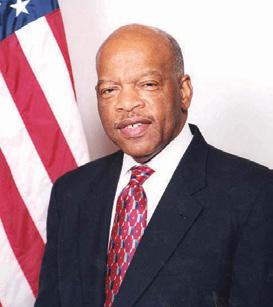
3 minute read
ONYX Magazine Salutes Congressman John Lewis and Rev. C.T. Vivian

The nation lost a formidable opponent of injustice in America. Congressman John Lewis lost his battle with pancreatic cancer on July 17, 2020. He was 80 years old. Lewis dedicated his life to protecting human rights, securing civil liberties, and building what he calls “The Beloved Community” in America.
U.S. Rep. Lewis was born the son of sharecroppers on February 21, 1940, outside of Troy, Ala. He grew up on his family’s farm and attended segregated public schools in Pike County, Ala. Inspired by the activism surrounding the Montgomery Bus Boycott and the words of the Rev. Dr. Martin Luther King Jr., he remained at the vanguard of progressive social movements and the human rights struggle in the United States.
As a student at Fisk University, Lewis organized sit-in demonstrations at segregated lunch counters in Nashville, Tenn. In 1961, he volunteered to participate in the Freedom Rides, which challenged segregation at interstate bus terminals across the South. Lewis risked his life on those Rides many times by simply sitting in seats reserved for white patrons.
At the age of 23, he was an architect of and a keynote speaker at the historic March on Washington in August 1963. During the height of the Movement, from 1963 to 1966, Lewis was named chairman of the Student Nonviolent Coordinating Committee (SNCC), which he helped form. Hosea Williams, another notable Civil Rights leader, and John Lewis led over 600 peaceful, orderly protestors across the Edmund Pettus Bridge in Selma, Ala. on March 7, 1965. The marchers were attacked by Alabama state troopers in a brutal confrontation that became known as “Bloody Sunday.”
Lewis was elected to Congress in November 1986 and has served as U.S. Representative of Georgia’s Fifth Congressional District since then. He was Senior Chief Deputy Whip for the Democratic Party in leadership in the House, a member of the House Ways & Means Committee, a member of its Subcommittee on Income Security and Family Support, and Ranking Member of its Subcommittee on Oversight.
www.johnlewis.house.gov
A leader in the Civil Rights Movement of the 1950s and 1960s has left an indelible mark on American history. Cordy Tindell Vivian, 95, died on July 17, 2020. He was an American minister, author and organizer. Vivian resided in Atlanta and founded the C. T. Vivian Leadership Institute, Inc. Vivian was born in Boonville, Mo. and lived in Macomb, Ill. He attended Western Illinois University in Macomb. His first professional job was recreation director for the Carver Community Center in Peoria, Ill. There, Vivian participated in his first sit-in demonstrations, which successfully integrated Barton’s Cafeteria in 1947.
Vivian studied for the ministry at American Baptist Theological Seminary (now called American Baptist College) in Nashville, helped found the Nashville Christian Leadership Conference, and helped organize the first sit-ins Nashville in 1960 and the first civil rights march in 1961. In 1961, Vivian participated in Freedom Rides. He worked alongside the Rev. Dr. Martin Luther King, Jr., as the national director of affiliates for the Southern Christian Leadership Conference. During the summer following the Selma Voting Rights Movement, Vivian conceived and directed an educational program, Vision, and put 702 Alabama students in college with scholarships (this program later became Upward Bound).[9] His 1970 “Black Power and the American Myth” was the first book on the Civil Rights Movement by a member of Martin Luther King’s staff.
In 2008, Vivian founded and incorporated the C. T. Vivian Leadership Institute, Inc. (CTVLI) to “Create a Model Leadership Culture in Atlanta” Georgia. The C. T. Vivian Leadership Institute conceived, developed and implemented the “Yes, We Care” campaign on December 18, 2008, and over a period of two and a half months, mobilized the Atlanta community to donate in excess of $500,000 directly to the financially stressed Morris Brown University as “bridge funding.” That effort saved the Historically Black College (HBCU).

